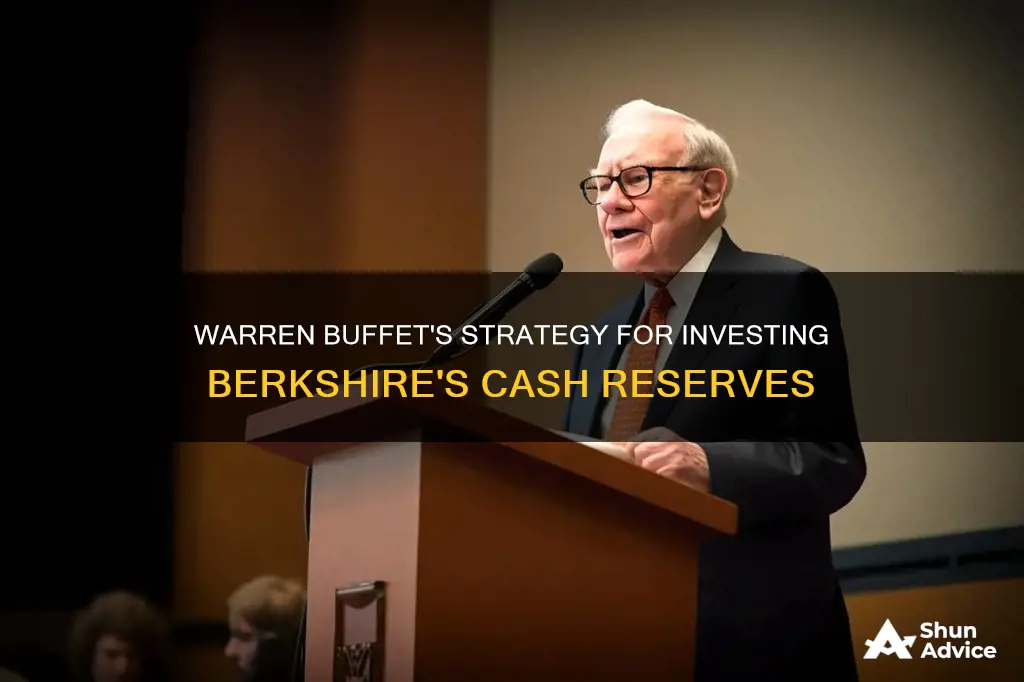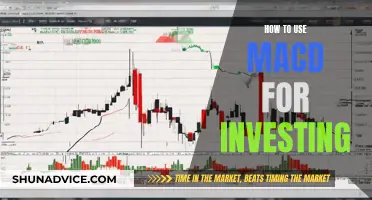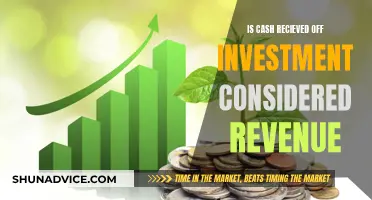
Warren Buffett, CEO of Berkshire Hathaway, has been steadily building up the company's cash reserves. As of November 2024, Berkshire's cash pile is estimated to be over $300 billion, with some sources placing the figure at $325.2 billion. This has led to speculation about Buffett's investment strategy and concerns about an imminent stock market crash. However, fund managers argue that Berkshire's cash position is not unusual when measured as a percentage of the company's total assets.
What You'll Learn

Berkshire Hathaway's cash reserves
The primary reason for the significant increase in Berkshire Hathaway's cash reserves is Warren Buffett's decision to sell portions of his biggest equity holdings, particularly Apple and Bank of America. In the third quarter alone, Berkshire shed $36.1 billion worth of stock. Buffett has also halted stock buybacks, with the company not repurchasing any shares during its selling spree. This is in contrast to previous quarters, where Berkshire had been actively buying back its own stock.
Some analysts have speculated that Buffett's move to build up such a large cash reserve indicates his concern about the market becoming overheated or his anticipation of a potential increase in capital gains tax. There is also the possibility that Buffett is preparing to hand over control of Berkshire and is, therefore, crystallising some of his gains to safeguard his legacy.
Despite the various interpretations, Buffett himself has provided some insight into his thinking. At the Berkshire annual meeting in May, he stated:
> "We only swing at pitches we like... We'd love to spend it, but we won't spend it unless we think [a business is] doing something that has very little risk and can make us a lot of money... it's just, things aren't attractive."
This suggests that Buffett is being selective and cautious in his investment approach, waiting for the right opportunities that meet Berkshire's criteria rather than investing hastily.
Operating vs Investing: Where Do Customers Fit in Cash Flow?
You may want to see also

Apple stock selling frenzy
Berkshire Hathaway, led by CEO Warren Buffett, has been on an Apple stock-selling spree, offloading what has been one of its most profitable trades of the past decade. This has resulted in Berkshire's cash reserves reaching an all-time high of $325.2 billion as of November 2024, with $277 billion recorded at the end of the second quarter. The company has sold more than two-thirds of its stake in Apple in just over a year, marking the fourth consecutive quarter of net equity sales.
The Apple-selling frenzy is part of a broader strategy by Buffett to pare down his equity holdings across the board. In the third quarter of 2024, Berkshire sold $36.1 billion worth of stock, including roughly 25% of its Apple holdings, and did not buy back any of its stock. This continued a trend of slowing buybacks after many quarters of sizable repurchases.
Buffett has cited two primary reasons for raising so much cash. Firstly, he believes that stocks are currently overpriced and trading above their intrinsic value. Secondly, he anticipates that capital gains taxes will increase in the coming years, and he wants to realise profits before that happens. During Berkshire's annual shareholder meeting in May, Buffett expressed his expectation that the US government will address its large fiscal deficits by raising taxes rather than reducing spending.
Despite the massive equity sales, Berkshire Hathaway has performed well over the last three years, with its shares rising 52%, outperforming the S&P 500's 22% increase over the same period. The company's large cash position has led to speculation about Buffett's outlook on the market and potential future investment plans. However, Buffett has indicated that he is simply being selective and waiting for the right opportunities to deploy capital.
Cash Reserves Investments: A Safe Haven for Your Money
You may want to see also

Bank of America share dumping
In 2024, Warren Buffett's Berkshire Hathaway sold a significant portion of its Bank of America (BofA) holdings, amounting to roughly $7.2 billion worth of shares. This move sparked speculation about the rationale behind it, especially given Buffett's long-standing admiration for BofA and its CEO, Brian Moynihan.
Reasons for the Share Dumping
- Raising Cash in Anticipation of a Recession: With a record-high cash balance, Buffett may be preparing for a potential economic downturn, ensuring he has sufficient liquidity to take advantage of any opportunities that arise during a recession.
- Concerns about the Banking Industry: After the regional banking crisis in 2023, Buffett hinted at underlying issues in the banking sector, suggesting a cautious approach to investing in banks due to the changing landscape of deposits, digitalization, and fintech.
- Stake Reduction: There is speculation that Berkshire wants to reduce its stake in BofA below 10% to avoid disclosing its trading activities. As of 2024, Berkshire still holds a 10.3% stake in Bank of America.
- Alternative Investment Opportunities: With the cash raised, Buffett may be seeking alternative investment opportunities that offer better prospects or are more aligned with Berkshire's criteria.
- Capital Gains Tax: Buffett mentioned that he was selling some stocks, including Apple, as a hedge against a potential increase in the capital gains tax rate. However, as of 2024, Washington does not appear to be pursuing such a policy change.
Impact on Investors
Despite Buffett's share dumping, Bank of America remains a solid investment option for value and dividend investors. The company has a strong financial position, with revenue of $25.4 billion in Q2 of 2024, beating Wall Street estimates. Additionally, BofA's balance sheet is growing, with increases in loans and average deposits. The stock trades at a reasonable valuation, with a price-to-earnings ratio of 14 and a dividend yield of 2.6%.
In conclusion, while Buffett's decision to sell Bank of America shares may be influenced by various factors, it does not necessarily reflect negatively on the bank's prospects. Investors should conduct their own due diligence and consider the positive aspects of BofA, such as its financial performance and dividend policy, when making investment decisions.
Mortgages: Cash or Investment? Understanding the Basics
You may want to see also

Capital gains tax increase
Warren Buffett's Berkshire Hathaway has been building its cash stockpile to record highs, with cash reserves of $325.2 billion as of November 2024. This has been attributed to Buffett's prediction of an increase in capital gains tax rates in the coming years, which has led him to pare down his equity holdings, including a significant reduction in his stake in Apple, one of his most profitable trades of the past decade.
Buffett's prediction of a capital gains tax increase is influenced by the expectation that the government will need to address the federal deficit, which stood at about 122% of the country's GDP as of 2023. During Berkshire Hathaway's annual shareholder meeting in May, Buffett stated, "I would say with present fiscal policies, I think something has to give, and I think higher taxes are quite likely." He also expressed his belief that companies should pay their fair share of taxes and that higher taxes are not a cause for concern.
The potential increase in capital gains tax rates has strategic implications for Berkshire Hathaway's investment decisions. The company has been a net seller of equities for eight consecutive quarters as of the third quarter of 2024, opting to hold a substantial amount of cash and short-term treasuries. This strategy reflects Buffett's preference for earning a return on cash and short-term treasuries rather than investing in the stock market, especially considering the high valuations and limited attractive opportunities.
While some commentators interpreted Berkshire Hathaway's large cash pile as a bearish signal for the stock market, fund manager Chris Bloomstran provided a nuanced perspective. He suggested that the cash position should be measured as a percentage of the firm's total assets, which puts it at about 17.5%, in line with its long-term average. Additionally, Bloomstran noted that Berkshire Hathaway is required to hold a significant amount of cash to fund potential insurance payouts, further justifying the sizeable cash reserve.
In summary, Warren Buffett's actions in building Berkshire Hathaway's cash reserves reflect his anticipation of a capital gains tax increase and his strategic approach to investing in a high-valuation market environment. The potential tax increase, aimed at addressing the federal deficit, has influenced Berkshire Hathaway's investment decisions and contributed to the company's record-high cash position.
Investing Cash: Strategies for Smart Money Allocation
You may want to see also

Lack of compelling investments
One of the reasons for Berkshire Hathaway's ballooning cash pile is the lack of compelling investments. Warren Buffett is a value investor with a keen eye for bargains, but in recent years, such opportunities have become scarce. The stock market has been surging to record highs, with the US stock market's total value hitting an unprecedented 198.1% of US GDP in the last quarter. This metric, known as the "Buffett Indicator", was once hailed by the investor himself as an excellent yardstick for valuations.
Lawrence Cunningham, the director of the University of Delaware's Weinberg Center for Corporate Governance, shares his opinion that the most probable cause of Berkshire's cash buildup is the absence of attractive investment opportunities. He points out that stocks have been surging to record highs, private business valuations have jumped, and Berkshire-owned businesses like Geico and See's Candies can only deploy so much capital.
Additionally, Berkshire Hathaway's massive size limits its investment options. According to fund manager Chris Bloomstran, the company's investable universe is slim due to its size, leaving only a small group of companies that can significantly impact the conglomerate. This dynamic further underscores the challenge of finding compelling investments that align with Berkshire's criteria and scale.
The scarcity of attractive investment opportunities has led to speculation about Buffett's outlook on the market and the economy. Some interpret his accumulation of cash as a bearish signal, suggesting that he anticipates a market decline or an economic collapse. However, others argue that it simply reflects the challenge of finding suitable investments for a company of Berkshire's magnitude.
Where Should Your Cash Go: Mortgage or Investment?
You may want to see also
Frequently asked questions
Berkshire Hathaway's cash pile has been reported to be anywhere between $189 billion and $325.2 billion.
Warren Buffet is the CEO of Berkshire Hathaway.
Warren Buffet has been selling shares and stacking up cash, leading to speculation about his motives.
Some speculated reasons include the prediction that capital gains tax rates will increase, a lack of compelling investment opportunities, and preparation for a potential economic downturn.
Warren Buffet has been selling stocks in companies such as Apple, Bank of America, BYD, and Chevron.







